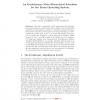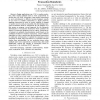2005 search results - page 39 / 401 » Models and Meta Models for Transactions in Web Applications |
COMMA
2010
13 years 2 months ago
2010
Argumentative discussions are common in Web 2.0 applications, but the social Web still offers limited or no explicit support for argumentation. As Web 2.0 applications become more ...
ISPASS
2010
IEEE
13 years 9 months ago
2010
IEEE
Abstract—Transactional memory promises to generalize transactional programming to mainstream languages and data structures. The purported benefit of transactions is that they ar...
GECCO
2004
Springer
14 years 29 days ago
2004
Springer
Abstract. The need for supporting CSCW applications with heterogeneous and varying user requirements calls for adaptive and reconfigurable schedulers accommodating a mixture of re...
ICPADS
1996
IEEE
13 years 11 months ago
1996
IEEE
A new multiagent programmingparadigm based on the transactional logic model' is developed. This paradigm enables us to construct a Distributed agent transactional program (DA...
DBKDA
2010
IEEE
14 years 20 days ago
2010
IEEE
Abstract—Design applications, e.g., CAD or media production, often require multiple users to work cooperatively on shared data, e.g., XML documents. Using explicit transactions i...


